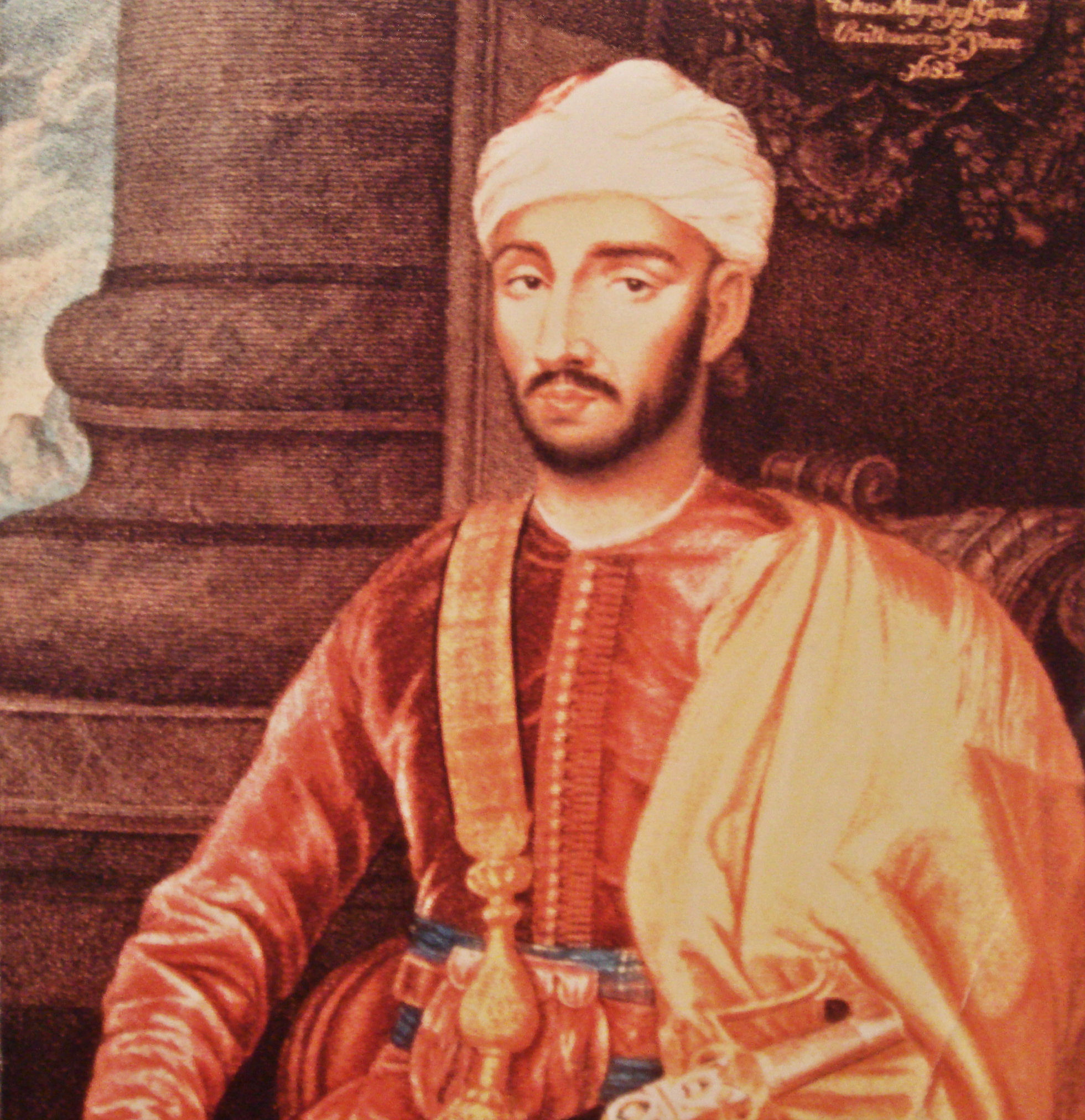Mohammed Bin Hadou on:
[Wikipedia]
[Google]
[Amazon]

 Mohammed ben Hadou (), also Mohammad bin Hadou, Mohammad bin Hadu or Muhammad ben Haddu al'Attar, was a Moroccan ambassador sent to the English court of Charles II by Muley Ismail in 1681–82.
Mohammed ben Hadou (), also Mohammad bin Hadou, Mohammad bin Hadu or Muhammad ben Haddu al'Attar, was a Moroccan ambassador sent to the English court of Charles II by Muley Ismail in 1681–82.
Wild enlightenment: the borders of human identity in the eighteenth century
' by Richard Nash p.54- According to the contemporary English commentator John Evelyn, he was the son of an English woman. He arrived in England on 29 December 1681, and left on 23 July 1682.
Performing identities on the Restoration stage
' by Cynthia Lowenthal p.215 His six-month visit to England was highly commented upon, publicized in the ''
/ref> At the theater the ambassador behaved "with extreme modesty and gravity". He struck a magnificent figure riding in Hyde Park. Mohammed returned to Morocco with a draft Peace and Trade Treaty which was finally not ratified by his king because of outstanding issues regarding the English military presence in Tangiers and English captives in Morocco. The exchanges started 40 years of a shiftingThomas Phelps, A True Account of the Captivity of Thomas Phelps at Machaness in Barbary and of His Strange Escape in Company of Edmund Baxter and Others, as Also of the Burning Two of the Greatest Pirat-Ships Belonging to That Kingdom in the River of Mamora upon the Thirteenth Day of June 1685 (London: Joseph Hindmarsh, 1685), p. 9.
/ref> Forty years of shifting alliances between the two countries would follow Mohammed's embassy.

 Mohammed ben Hadou (), also Mohammad bin Hadou, Mohammad bin Hadu or Muhammad ben Haddu al'Attar, was a Moroccan ambassador sent to the English court of Charles II by Muley Ismail in 1681–82.
Mohammed ben Hadou (), also Mohammad bin Hadou, Mohammad bin Hadu or Muhammad ben Haddu al'Attar, was a Moroccan ambassador sent to the English court of Charles II by Muley Ismail in 1681–82.Wild enlightenment: the borders of human identity in the eighteenth century
' by Richard Nash p.54- According to the contemporary English commentator John Evelyn, he was the son of an English woman. He arrived in England on 29 December 1681, and left on 23 July 1682.
Performing identities on the Restoration stage
' by Cynthia Lowenthal p.215 His six-month visit to England was highly commented upon, publicized in the ''
London Gazette
London is the capital and List of urban areas in the United Kingdom, largest city of England and the United Kingdom, with a population of just under 9 million. It stands on the River Thames in south-east England at the head of a estuary dow ...
'' and was even the subject of occasional poems.Nabil Matar, ''Turks, Moors, and Englishmen in the Age of Discovery'', pp38f. He visited Oxford and Cambridge among many other places and became a Fellow of the Royal Society in April.
John Evelyn recorded that he was "the fashion of the season", and commented on him that he was "a handsome person, well featured and of a wise look, subtile and extremely civile".''The genius of the English nation'' by Anna Suranyi p.58-/ref> At the theater the ambassador behaved "with extreme modesty and gravity". He struck a magnificent figure riding in Hyde Park. Mohammed returned to Morocco with a draft Peace and Trade Treaty which was finally not ratified by his king because of outstanding issues regarding the English military presence in Tangiers and English captives in Morocco. The exchanges started 40 years of a shifting
Anglo-Moroccan alliance
The Anglo-Moroccan alliance''Britain and Morocco during the embassy of John Drummond Hay, 1845-1886'' Khalid Ben Srhir, Malcolm Williams, Gavin Waterson p.13-1/ref> was established at the end of the 16th century and the early 17th century between t ...
related to European conflicts, trade issues, Barbary Coast pirates and the exchange of captives.
England Socinians wrote letters for Mohammed bin Hadou to remit to Mulay Ismail, in which they praised God for having "preserved your Emperor and his people in the excellent knowledge of that truth touching your belief in a onely sovereign God, who has no distinct ..or plurality of persons", and praising "Mahomet" for being "a scourge on those idolizing Christians". However, they also complained that the Qur'an contained contradictions that must have been a consequence of its editing after Mohammed's death.
During his stay Mohammed bin Hadou's interpreter Lucas apparently married an English servant who would accompany the lot back to Morocco. But Lucas ended up stealing some money from Mohammed bin Hadou and ran away. He was caught and cross-examined, after which he was locked up at Newgate prison. But Mohammed bin Hadou forgave him and let him return to Morocco with him
Following Mohammed bin Hadou's return to Morocco he acquired a reputation, in the eyes of the English slaves held there, of being particularly cruel towards them./ref> Forty years of shifting alliances between the two countries would follow Mohammed's embassy.
See also
*Anglo-Moroccan alliance
The Anglo-Moroccan alliance''Britain and Morocco during the embassy of John Drummond Hay, 1845-1886'' Khalid Ben Srhir, Malcolm Williams, Gavin Waterson p.13-1/ref> was established at the end of the 16th century and the early 17th century between t ...
* Islam and Protestantism
Protestantism and Islam entered into contact during the early-16th century when the Ottoman Empire, expanding in the Balkans, first encountered Calvinist Protestants in present-day Hungary and Transylvania. As both parties opposed the Aust ...
Notes
{{DEFAULTSORT:Hadou, Mohammed bin Moroccan diplomats Morocco–United Kingdom relations Ambassadors of Morocco to the Kingdom of England 17th-century Moroccan people 18th-century Moroccan people 17th-century diplomats 1680s in England Fellows of the Royal Society Year of birth missing Year of death missing